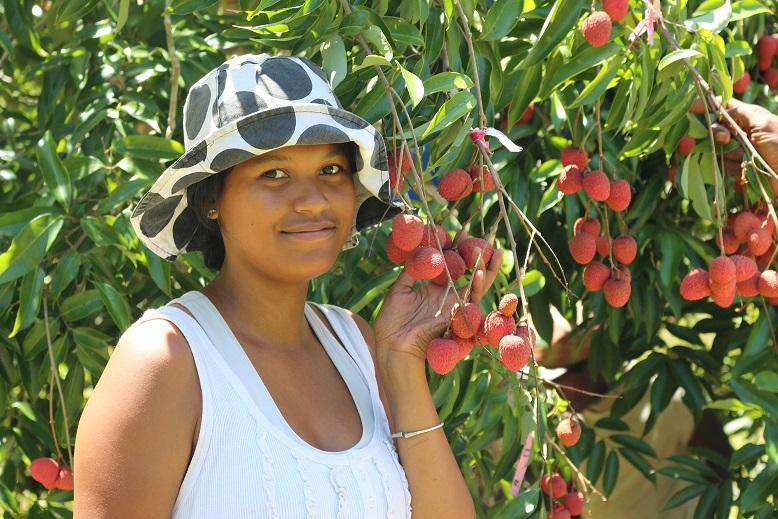- Home
- Worldwide
- CIRAD worldwide
- Projects
- QUALINNOV 2 project
Innovation and research on the quality of agro-food products in the Indian Ocean - QUALINNOV 2

Madagascar's main advantage over its competitors is the earliness of its harvest, which enables it to be the first to reach European markets © CIRAD
Issues
Food and nutritional security is a priority for the countries of the Indian Ocean. During the donors’ conference on 19-20 February 2015, organised by the Indian Ocean commission (IOC) in Antananarivo, the institutions and donors insisted on the need for operators and scientists to develop local food production systems by supporting economic sectors and protecting consumer health, and to improve the nutritional quality of food products through innovation in production and processing systems.
Description
The Qualinnov 2 project follows on from phase 1 (2014-2017) and presents a series of actions for the period 2018-2020 concerning:
- the production of knowledge on the products of the Indian Ocean region (Action 1),
- support for the emergence of collective approaches towards labels (Action 2).
Expected changes/results
- Authenticating and promoting honey from Rodrigues: accompanying a panel of producers from Rodrigues capable of determining and comparing the sensory characteristics of Rodrigues honey;
- Establishing linkages between crop management and fruit tree yields (Madagascar): the design of more intensive cropping systems (mangoes); a yield prediction method (lychees, cloves);
- Ensuring the quality of fresh and processed fruit (post-harvest) (Reunion Island, Madagascar, Comoros, Mauritius): implementation of alternative treatments and development of innovative processing/preservation systems to ensure the quality of fruit crops (pineapples, mangoes, citrus fruits) in the Indian Ocean;
- Authenticating and promoting the quality and typicity of wild pepper from the Indian Ocean (Madagascar, Reunion Island): physical-chemical and nutraceutical properties, production systems, processing techniques and methods to express, authenticate and promote the quality and typicity of wild pepper from the Indian Ocean in the context of sustainable value chains (NIRS and sensory analysis);
- Characterising the nutritional and antioxidant properties of the pulp and oil of different baobab species in Madagascar: information on the micronutrient content of the oil and pulp of baobabs in Madagascar according to species and location; optimisation of production, preservation and marketing processes for baobab oil and pulp; transfer of optimised technologies to support the development of baobab oil production and consumption in Madagascar;
- Characterising the quality of ylang ylang essential oils and detecting fraud using near-infrared spectrometry (Comoros).
Results of action 2
- Ensuring the transfer of the methodology by supporting dedicated groups and conducting workshops on the implementation of labelling processes and collective marks;
- Raising awareness and enhancing knowledge of the qualification, recognition and promotion of products based on their origin: PGI cacao in Madagascar; analysis of the economic, social and environmental viability of wild pepper value chains in Madagascar; definition of a collective strategy for the economic development of high value-added products (ylang ylang in the Comoros).
Results of action 3
- Producing an updated information base on the health hazards associated with food in the Indian Ocean islands, in particular on the parasites transmitted by meat (pork), synthetic hormone residues (pork), mycotoxins (cereals) and heavy metals (fish);
- Establishing methods for multi-criteria analysis of the health hazards associated with food products;
- Ensuring the transfer of competence for the rapid detection and quantification of residues and contaminants in food products (Madagascar, Mauritius, Seychelles, Comoros).
Expected impacts
Regional cooperation will be structured in order to collectively improve food and nutritional security in the Indian Ocean region and to promote heritage products, a process involving several stages:
- The promotion of characteristic products of the Indian Ocean, derived from distinct agricultural resources and/or animal products, traditional local knowledge and a strong culture;
- Capacity building in certification and labelling for actors in the sectors concerned;
- Controlling the health quality of food products with regard to biological and chemical contaminants in the production sectors and regions.
Scientific partners
Madagascar
• University of Antananarivo
• FOFIFA
• Ministry of Agriculture of Madagascar / Veterinary Services Department (DSV)
• Laboratoire National de Diagnostic Vétérinaire (LNDV)
• Institut Pasteur de Madagascar (IPM)
• Centre National de Recherches sur l’Environnement (CNRE)
• Ecole Supérieure des Sciences Agronomiques (ESSA)
• Centre Technique Horticole de Tamatave (CTHT)
• Association Science & Femmes de Madagascar (ASFM)
Mauritius
• University of Mauritius (including the Faculty of Agriculture and the Centre for Biomedical and Biomaterials Research (CBBR))
• Food and Agricultural Research and Extension Institute (FAREI)
• Rodrigues Regional Assembly
Union of the Comoros
• University of the Comoros – Faculty of Science and Technology (FST)
• Institut National de Recherche pour l’Agriculture, la Pêche et l’Environnement – Ministry of Agriculture, Fisheries and Environment (INRAPE)
Seychelles
• Seychelles Bureau of Standards
• National Institute for Science, Technology & Innovation (NISTI)
France – Reunion Island
• University of Reunion Island (including the Qualisud research unit, ESIROI, IUT de St Pierre) – Reunion Island
• Institut de la Qualité et de l’Agro-écologie – IQUAE – Reunion Island
• Cyclotron Réunion Océan Indien – CYROI – Reunion Island
• Ecole Nationale Vétérinaire, Agroalimentaire et de l'alimentation de Nantes-Atlantique – ONIRIS























